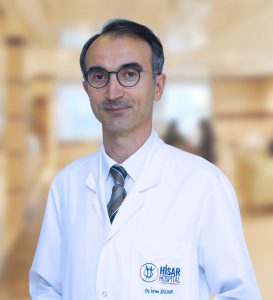Medical, physiological and psychological problems may occur in pilots and flight personnel as well as passengers due to exposure to high altitude, low pressure, low temperature, cosmic radiation, speed and accelerated movements. Aviation medicine’s mission can be briefly defined as “creating solutions for such problems as well as preventive medicine and educational activities”.
In this context, aviation medical examiner deals with below written problems: Low oxygen concentration at high altitude (hypoxia); low pressure (decompression disease), balance and orientation problems (disorientation, vertigo); visual illusions; air sickness; jet-lag; disorders caused by gravity forces (tunnel vision, black-out); noise; vibration; medical problems related to jumping out of the plane; flight fears; and physiological and psychological problems in space flights etc. Although above listed diseases do not cover all potential problems, they may not only challenge an efficient and safe flight, but they may also lead to medical disorders and flight accidents. Since the human factor accounts for 70-80% of all flight accidents, overall health of pilots and flight personnel are supervised by the physicians who are educated in the field of aviation medicine, which is the inevitable part of the medical flight safety.
Our Aviation Medicine Center was opened upon the authorization by Aviation Medicine Section of Flight Operations Department in General Directorate of Civil Aviation on March 22, 2010. Certain services, including but not limited to initial/periodical examinations for pilots and flight personnel of Turkish Airlines, pilots and flight personnel of private airline companies (Pegasus, Atlasjet), privately owned flying schools and foreign pilots of countries member to JAA, are delivered based on the internationally acknowledged authorization given by Directorate General of Civil Aviation.
Aeromedical examination involves first and periodical examination as well as health certificates for all pilots, pilot candidates, technical personnel and all other flight staff.
Health standards of aviators are regulated by Aviation Health Directive (SHT-MED) and ICAO (International Civil Aviation Organization) Annex I in Turkey. Aeromedical examinations should be done at certain intervals depending on type of aircraft and duty and age of the pilot. These examinations aim to check whether well being status of pilots and flight personnel, who should always be healthy, continues and to ensure they are healthy. Our center makes best efforts to deliver best service by experienced personnel to pilots, pilot candidates and all flight personnel based on ever increasing quality in aeromedical examinations. Aviation medical examiner and the pilot should trust each other and an appropriate environment should be ensured to support this goal. We, aviation medical examiners, are at a distance of a phone call round the clock for all health problems and questions of all pilots who have such a delicate duty. We are waiting for all pilots and flight personnel.
Aviator personnel classes served at our center
- Initial and periodical examination for Class 1 piloting
- Initial and periodical examination for Class 2 piloting
- Initial and periodical examination for cabin crew
- Initial and periodical examination for aircraft maintenance technician
- Initial and periodical examination for loadmaster
- Initial and periodical examination for dispatcher
- Initial and periodical examination for air traffic controller
- Initial and periodical examination for apron license
- Initial and periodical examination for healthcare certificate to indicate fit to fly with parachute
- Fit-to-fly health certificates for passengers
- Aeromedical examination for pilots of unmanned aerial vehicle (UAV0, UAV1, UAV2, UAV3)
- Examination of Aviation Management Program Student
- Initial and periodical examination for airplane or helicopter police officer
Documents to be submitted in examination
- 2 Photographs
- Previous health certificate (for periodical examinations)
- Fasting for a certain interval in the examination day (breakfast is available)
- Identity card (passport)
Note: Eye glasses and lenses should be brought to the periodical examinations.
Aeromedical examinations are performed before the employment and at intervals mandated by the regulation pursuant to the Aviation Health Guideline (SHT-MED) and Aeromedical Examinations, Health Certificate and Aeromedical Examination Reports Procedures – Annex 1.
Examinations and tests required in this context
- Psychiatry
- Neurology
- Comprehensive Otorhinolaryngological Examination
- Comprehensive Ophthalmology examination
- Internal Medicine Examination
- Examination by aeromedical examiner
- Complete blood count, urinalysis, erythrocyte sedimentation rate, FBG, Creatinine, Total Cholesterol, Triglyceride, ALT, AST, GGT, LDL and HDL
- Chest X-ray, PA
- Pulmonary Function Test
- Computerized Visual Field Test
- ECG
- Audiometry, Tympanometry (Hearing Test)
Minimum requirements of Periodical Examinations for Class 1 Health Certificate
ECG:
- Once every 5 years up to 30 years of age
- Once every 2 years between 30 and 39 years of age
- Once a year between 40 and 49 years of age
- In each examination at or above 50 years of age
Audiometry
- Once every 5 years up to 40 years of age
- Once every 2 years over 40 years of age
Visual field
- Once every 5 years up to 40 years of age
- Once every 2 years over 40 years of age
Pulmonary Function Test
- Once every 5 years up to 40 years of age
- Once every 4 years over 40 years of age
Chest X-ray
- Once every 5 years up to 40 years of age
- Once every 4 years over 40 years of age
Complete blood count and urinalysis in each examination

